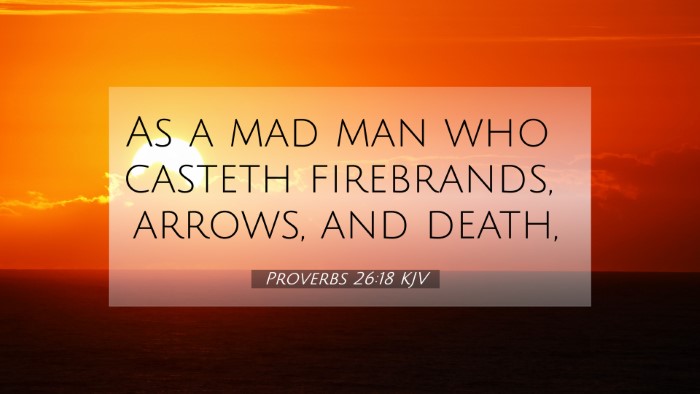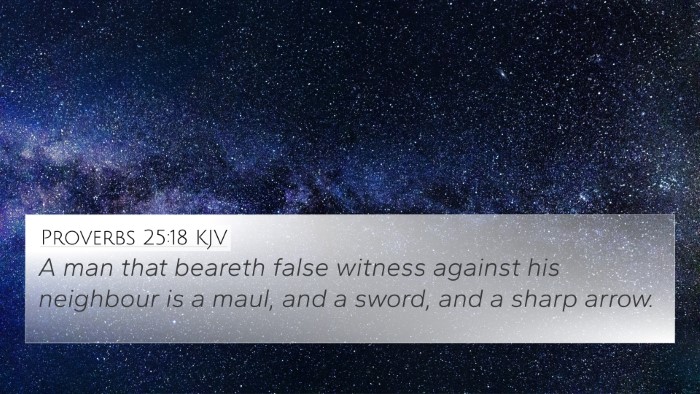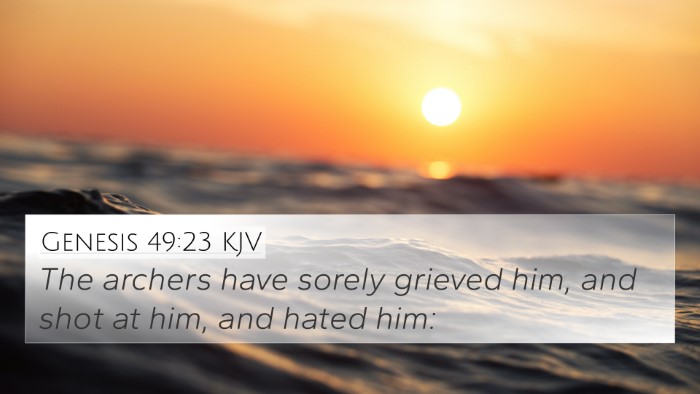Understanding Proverbs 26:18
Proverbs 26:18 states: "Like a madman who throws firebrands, arrows, and death." This verse vividly illustrates the consequences of folly and recklessness.
Meaning and Interpretation
This verse serves as a metaphorical warning against engaging in foolishness or malicious actions. The image of a madman indicates instability and danger. Just as a madman indiscriminately throws weapons, so too does folly endanger oneself and others.
Commentary Insights
- Matthew Henry: Highlights the recklessness associated with foolish actions, which can lead to chaos and destruction, paralleling the act of throwing firebrands without regard.
- Albert Barnes: Notes that the verse emphasizes the need for self-restraint and wisdom, illustrating that a fool's actions can have serious, unintended consequences.
- Adam Clarke: Points out that the verse implies an association between madness and the nature of foolishness, leading to disastrous outcomes, reminiscent of destructive behavior in society.
Cross-References
Proverbs 26:18 can be connected to several other Bible verses, emphasizing the theme of folly and recklessness:
- Proverbs 14:16: "A wise man fears and departs from evil, but a fool rages and is self-confident."
- Proverbs 10:23: "To do evil is like sport to a fool, but a man of understanding has wisdom."
- Galatians 6:7-8: "Do not be deceived: God is not mocked, for whatever one sows, that will he also reap."
- Ecclesiastes 10:12: "The words of a wise man’s mouth are gracious, but the lips of a fool shall swallow him up."
- James 3:6: "And the tongue is a fire, a world of iniquity; the tongue is so set among our members that it defiles the whole body."
- Proverbs 27:3: "A stone is heavy, and the sand weighty; but a fool's wrath is heavier than them both."
- Proverbs 18:2: "A fool has no delight in understanding, but in expressing his own heart."
Thematic Connections
Exploring the connections between Bible verses provides deeper insights into the nature of folly and wisdom:
- Folly versus Wisdom: Proverbs constantly contrasts the behaviors and outcomes related to wise and foolish actions.
- Consequences of Actions: The Bible frequently discusses the repercussions of decisions, as illustrated in Galatians 6:7-8, reinforcing the need for thoughtful behavior.
- Destruction through Ignorance: Similar themes can be found throughout Proverbs, cautioning against impulsive actions as seen in Proverbs 14:16.
Applying the Insights
When studying Proverbs 26:18, one can utilize various tools for cross-referencing and exploring biblical themes. Tools such as a Bible concordance and Bible cross-reference guide are invaluable in identifying connections between verses. Engaging in cross-reference Bible study enables deeper understanding and encourages readers to develop a more comprehensive view of biblical wisdom.
Practical Applications
- Self-Reflection: Consider your actions and their potential consequences before acting.
- Encouraging Wisdom: Promote the value of wisdom in both personal and communal life to avoid the pitfalls of folly.
- Community Dialogue: Use biblical insights to foster discussions around moral and ethical behavior.
In Conclusion
Proverbs 26:18 serves as a powerful reminder of the chaos that can arise from foolishness. By cross-referencing with related scripture, we gain a clearer understanding of the dangers associated with reckless behavior. As we grow in our understanding of the connections between Bible verses, we equip ourselves to make wiser decisions in our daily lives.






